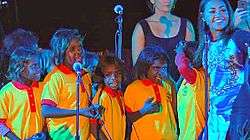Yorta Yorta language
| Yorta Yorta | |
|---|---|
| Yotayota | |
| Murray–Goulburn | |
| Region | Victoria, Australia |
| Extinct | (date missing)[1] |
| Revival | 21 (2006 census)[2] |
|
Pama–Nyungan
| |
| Language codes | |
| ISO 639-3 |
xyy |
| Glottolog |
yort1237[3] |
| AIATSIS[2] |
D2 |
Yorta Yorta (Yotayota) is a dialect cluster, or perhaps a group of closely related languages, spoken by the Yorta Yorta people, Indigenous Australians from the junction of the Goulburn and Murray Rivers in present-day northeast Victoria. Dixon considers it an isolate.
Yorta Yorta clans include the Bangerang, Kailtheban, Wollithiga, Moira, Penrith, Ulupna, Kwat Kwat, Yalaba Yalaba and Nguaria-iiliam-wurrung.[4] The name is also spelled Jotijota, Jodajoda, Joti-jota, Yodayod, Yoda-Yoda, Yoorta, Yota, Yoti Yoti, Yotta-Yotta, Youta; other names are Arramouro, Boonegatha, Echuca, Gunbowerooranditchgoole, Gunbowers, Kwart Kwart, Ngarrimouro ~ Ngarrimowro, Unungun, Wol-lithiga ~ Woollathura.
Although the language is considered dormant due to contact with Europeans and forcible dislocation to missions, the Yorta Yorta had maintained many words. There have been strong moves of late to revive the language.
Two Yorta Yorta women, Lois Peeler and Sharon Atkinson, together with Dr Heather Bowe from Monash University, worked for several years to compile a comprehensive record of research material, entitled Yorta Yorta Language Heritage. This work provided a summary of existing written records, with reference to the spoken resources, and included introductory lessons in Yorta Yorta, together with English to Yorta Yorta and Yorta Yorta to English dictionaries.
Music

The track "Ngarra Burra Ferra" sung by indigenous artist Jessica Mauboy from the 2012 hit film The Sapphires is a song based on the traditional Aboriginal hymn "Bura Fera." [5] The song is in the Yorta Yorta language and speaks of the Lord God's help in decimating a Pharaoh's armies. The chorus, Ngara burra ferra yumini yala yala, translates into English as "The Lord God drowned all Pharaoh's armies, hallelujah!" These lyrics are based on an ancient song in Jewish tradition known as the “Song of the Sea” or “Miriam’s Song”, as it was composed and sung by Miriam, older sister of the prophet Moses. It can be found in Exodus 15, especially verse 4, “Pharaoh’s chariots and his host hath he cast into the sea: his chosen captains also are drowned in the Red sea." Aboriginal communities of Victoria and southern New South Wales may be the only people in the world who still sing the piece (in Yorta Yorta).[5]
References
- ↑ Yorta Yorta at Ethnologue (17th ed., 2013)
- 1 2 Yorta Yorta at the Australian Indigenous Languages Database, Australian Institute of Aboriginal and Torres Strait Islander Studies
- ↑ Hammarström, Harald; Forkel, Robert; Haspelmath, Martin; Bank, Sebastian, eds. (2016). "Yorta Yorta". Glottolog 2.7. Jena: Max Planck Institute for the Science of Human History.
- ↑ Yorta Yorta Co-operative Management Agreement Archived September 13, 2006, at the Wayback Machine.
- 1 2 "The lyrics to Bura Fera". towalkwithyou.com. 13 September 2013. Retrieved 26 April 2014.
External links
- http://web.archive.org/web/20061012231600/http://www.fatsil.org:80/LOTM/oct99.htm
- Monash University Library
- Bibliography of Bangerang language and people resources, at the Australian Institute of Aboriginal and Torres Strait Islander Studies